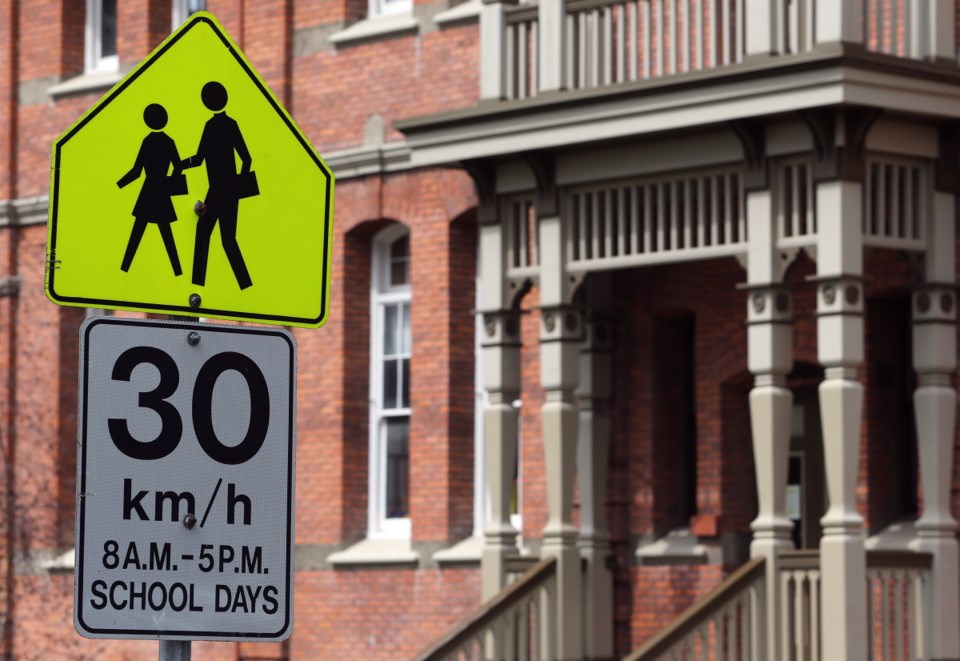 There’s one little phrase in B.C.’s labour law that could be exploited as a long-shot way to end the teacher strike.
There’s one little phrase in B.C.’s labour law that could be exploited as a long-shot way to end the teacher strike.
It has to do with the concept of essential-service designation, which to the surprise of some still applies to the education system, all recent evidence to the contrary. It’s remarkable that a nominally essential service could be completely shut down for half of June and still be closed for business in the first week of September.
It has to do with a number of previous Labour Relations Board decisions that collectively built the current understanding of how essential-service designations work. The two sides have argued essential services numerous times before the LRB over the years, usually when there’s a partial withdrawal of services. The rulings stipulate that things like Grade 12 report cards and safety supervision during limited work stoppages are essential. But somehow, there’s room within all the previous interpretations of the law for a wholesale shutdown of the school system.
The exact wording in the Labour Relations Code requires the LRB to designate services that the board considers essential to prevent danger to health or safety, “or to prevent immediate and serious disruption to the provision of educational programs.”
But in the most relevant recent ruling, from 2011, the board found that a total shutdown of up to two weeks would be allowable without designating essential services.
B.C. passed that point by the end of June and will almost certainly clock another week of full downtime by the end of this week.
So what’s the exact mechanism for recognizing the obvious fact that the school system is an essential public service?
Either party may apply to the LRB for essential-service designation. It would be complicated for either the government or the B.C. Teachers’ Federation to apply. In the past, that’s been a prelude to back-to-work legislation, which Education Minister Peter Fassbender continues to swear isn’t going to happen this time.
And although the BCTF made an essential-services application in April, that was just a tactical move to head off the threatened loss of health benefits. The union has spent years arguing against the concept that education is an essential service, and argued in 2005 that a shutdown could last as long as three months before the designation should kick in.
So it would be a wild-card play for the union, and a move that would simply bounce the ball back into Fassbender’s court, as far as the government is concerned.
But there’s one other player allowed to make the move. That’s the chairman of the LRB.
“The chair may, on the chair’s own motion or on application by either of the parties …” is how the section reads.
It allows the LRB chair to investigate whether the dispute poses a threat to the provision of educational programs to students and eligible children under the School Act and report the results to the minister.
Fassbender and BCTF president Jim Iker are both hunkered down now, polishing their platitudes and hoping the other side winces first.
There’s a sliver of a chance that either of them would make such a move.
But if the LRB wanted to take a proactive role and make a long-shot bid to break the impasse, this would be a way for chairman Brent Mullin to do it. Investigate and report the foregone conclusion to the minister. The code then says the minister can direct the LRB to set essential-service levels necessary to “prevent serious disruption.”
That route could theoretically open schools to some degree without legislation, while waiting for something productive to finally happen. And it would be unlikely to run afoul of the courts, which is a prime consideration.
Just So You Know: The B.C. Liberal government wrote education back into the essential-service designation in 2001. Then-labour minister Graham Bruce told the legislature one of the reasons was that four million student-days had been lost to labour disputes over the previous 10 years.
By contrast, so far this year B.C. has lost about eight million student-days in just June and September.



